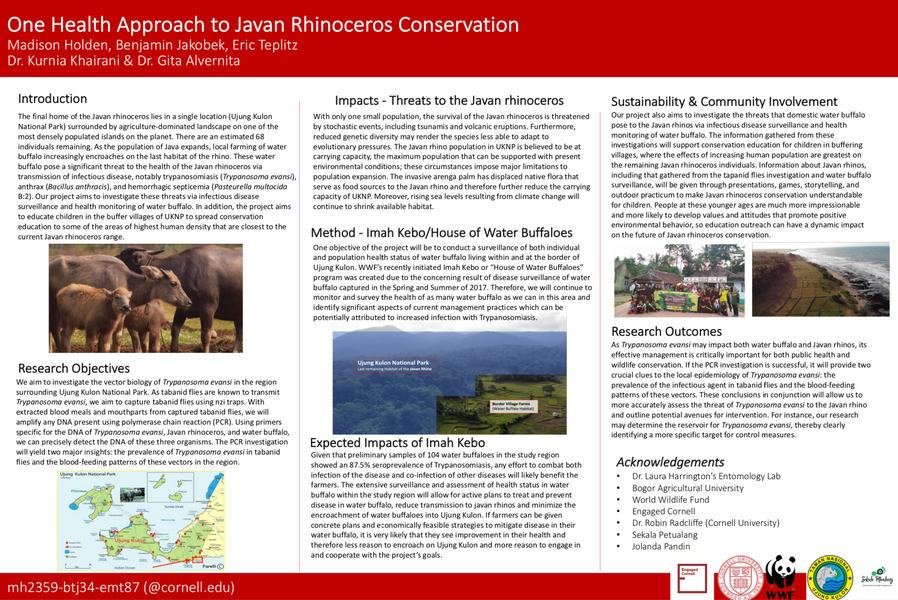Ujung Kulon National Park
Rhino Conservation through disease surveillance and community engagement

Cegog
Our Work

Disease Surveillance
The final home of the Javan rhinoceros lies in a single location (Ujung Kulon National Park) surrounded by agriculture-dominated landscape on one of the most densely populated islands on the planet.
There are an estimated 68 individuals remaining. As the population of Java expands, local farming of water buffalo increasingly encroaches on the last habitat of the rhino. These water buffalo pose a significant threat to the health of the Javan rhinoceros via transmission of infectious disease, notably trypanosomiasis (Trypanosoma evansi), anthrax (Bacillus anthracis), and hemorrhagic septicemia (Pasteurella multocida B:2).
Our project aims to investigate these threats via infectious disease surveillance and health monitoring of water buffalo. In addition, the project aims to educate children in the buffer villages of UKNP to spread conservation education to some of the areas of highest human density that are closest to the current Javan rhinoceros range.
Community Engagement
Our project also aims to investigate the threats that domestic water buffalo pose to the Javan rhinos via infectious disease surveillance and health monitoring of water buffalo.
The information gathered from these investigations will support conservation education for children in buffering villages, where the effects of increasing human population are greatest on the remaining Javan rhinoceros individuals. Information about Javan rhinos, including that gathered from the tabanid flies investigation and water buffalo surveillance, will be given through presentations, games, storytelling, and outdoor practicum to make Javan rhinoceros conservation understandable for children.
People at these younger ages are much more impressionable and more likely to develop values and attitudes that promote positive environmental behavior, so education outreach can have a dynamic impact on the future of Javan rhinoceros conservation.


Conservation Education
By partnering with local organizations such as WWF and Sekala Petualang (School of Conservation Education and Adventure), we are working towards educating children and adults living near Ujung Kulon National Park (particularly Ujung Jaya and Cegog Villages) on the importance of reducing waste, preventing pollution and generally caring for the environment around them. Trash infrastructure is very poor in Indonesia and Indonesians have few options for disposing of their trash.
Our partners have found new ways to make conservation and environmental stewardship both fun and educational for all ages. The importance of conservation education in places like Ujung Kulon is imperative and is therefore a key purpose of this project as a whole.
Disease Prevention
Given the anatomical and phylogenetic similarity between Javan rhinos and domestic ungulates such as water buffalo and domestic cattle, preventing transmission of disease between them is incredibly important. One of the ways we are working to accomplish this is by increasing the health and welfare of water buffalo and cattle living in villages around Ujung Kulon so as to make them less susceptible to infective agents and less likely to serve as reservoirs of disease.
Given that preliminary samples of 104 water buffaloes in the study region showed an 87.5% seroprevalence of Trypanosomiasis, any effort to combat both infection of the disease and co-infection of other diseases will likely benefit the farmers. The extensive surveillance and assessment of health status in water buffalo within the study region will allow for active plans to treat and prevent disease in water buffalo, reduce transmission to javan rhinos and minimize the encroachment of water buffaloes into Ujung Kulon.
If farmers can be given concrete plans and economically feasible strategies to mitigate disease in their water buffalo, it is very likely that they see improvement in their health and therefore less reason to encroach on Ujung Kulon and more reason to engage in and cooperate with the project’s goals.


















